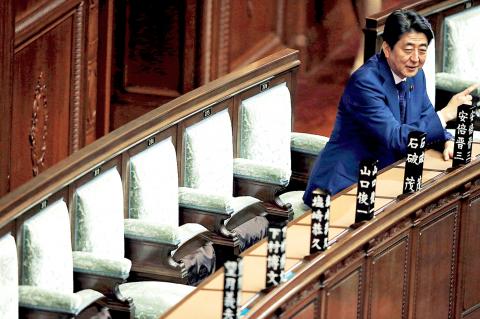They filed frivolous no-confidence motions. They made long-winded speeches to explain them. One employed the “cow walk,” moving slowly like a cow to the podium to vote on a motion.
Japanese opposition parties yesterday pulled out all the stops in a last-ditch effort to block a vote on security bills that would fundamentally change the way Japan uses its military, a highly sensitive issue in a nation where many take pride in its pacifist constitution.
Lawmakers met all day and into the evening before an expected late-night vote by the Upper House to allow Japan to go into combat to defend nations other than itself for the first time since the end of World War II, after which Japan adopted a constitution that renounces the right to wage war.

Photo: Reuters
The opposition’s tactics caused longer-than-expected delays, though the eventual passage of the bills is all but assured because of the ruling bloc’s majority.
Opposition Democratic Party of Japan leader Katsuya Okada said it would do “whatever it takes” to block a vote.
The bills have already passed the more powerful Lower House.
Joined by several other opposition parties, the Democrats submitted no-confidence motions in the Upper House against Japanese Prime Minister Shinzo Abe, Japanese Minister of Defense Gen Nakatani and Upper House President Masaaki Yamazaki. The motions were all voted down, but each took several hours to complete.
One opposition lawmaker, Taro Yamamoto, used a snail-paced “cow walk” to shuffle to the podium, while others made drawn-out speeches, a variation that has become known as the “cow tongue.”
Yamamoto wore a black suit and tie with Buddhist prayer beads around his wrist, as if attending a funeral.
He was repeatedly scolded by the house president, who eventually banned any more “cow walk” attempts.
The legislation would allow the military to defend Japan’s allies even when the nation is not under attack, work more closely with the US and other allies, and do more in international peacekeeping.

FALSE DOCUMENTS? Actor William Liao said he was ‘voluntarily cooperating’ with police after a suspect was accused of helping to produce false medical certificates Police yesterday questioned at least six entertainers amid allegations of evasion of compulsory military service, with Lee Chuan (李銓), a member of boy band Choc7 (超克7), and actor Daniel Chen (陳大天) among those summoned. The New Taipei City District Prosecutors’ Office in January launched an investigation into a group that was allegedly helping men dodge compulsory military service using falsified medical documents. Actor Darren Wang (王大陸) has been accused of being one of the group’s clients. As the investigation expanded, investigators at New Taipei City’s Yonghe Precinct said that other entertainers commissioned the group to obtain false documents. The main suspect, a man surnamed

DEMOGRAPHICS: Robotics is the most promising answer to looming labor woes, the long-term care system and national contingency response, an official said Taiwan is to launch a five-year plan to boost the robotics industry in a bid to address labor shortages stemming from a declining and aging population, the Executive Yuan said yesterday. The government approved the initiative, dubbed the Smart Robotics Industry Promotion Plan, via executive order, senior officials told a post-Cabinet meeting news conference in Taipei. Taiwan’s population decline would strain the economy and the nation’s ability to care for vulnerable and elderly people, said Peter Hong (洪樂文), who heads the National Science and Technology Council’s (NSTC) Department of Engineering and Technologies. Projections show that the proportion of Taiwanese 65 or older would

The government is considering polices to increase rental subsidies for people living in social housing who get married and have children, Premier Cho Jung-tai (卓榮泰) said yesterday. During an interview with the Plain Law Movement (法律白話文) podcast, Cho said that housing prices cannot be brought down overnight without affecting banks and mortgages. Therefore, the government is focusing on providing more aid for young people by taking 3 to 5 percent of urban renewal projects and zone expropriations and using that land for social housing, he said. Single people living in social housing who get married and become parents could obtain 50 percent more

Democracies must remain united in the face of a shifting geopolitical landscape, former president Tsai Ing-wen (蔡英文) told the Copenhagen Democracy Summit on Tuesday, while emphasizing the importance of Taiwan’s security to the world. “Taiwan’s security is essential to regional stability and to defending democratic values amid mounting authoritarianism,” Tsai said at the annual forum in the Danish capital. Noting a “new geopolitical landscape” in which global trade and security face “uncertainty and unpredictability,” Tsai said that democracies must remain united and be more committed to building up resilience together in the face of challenges. Resilience “allows us to absorb shocks, adapt under